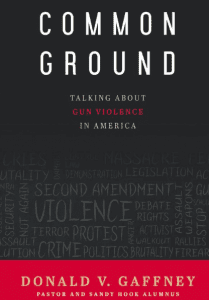 Gun violence is matched seemingly weekly by pleas for gun control and by counter pleas for gun rights. All sorts of guns, hand guns and guns that make absolutely no sense for any person to own.
Gun violence is matched seemingly weekly by pleas for gun control and by counter pleas for gun rights. All sorts of guns, hand guns and guns that make absolutely no sense for any person to own.
What about Christians? What about the way of the cross and gun violence, gun control and gun rights? Does the way of the cross have anything to do with these questions? Is it all about rights?
A new book by a pastor, one who grew up (as I did) with guns for toys as a child and then owned a gun for hunting, Donald V. Gaffney is called Common Ground: Talking about Gun Violence in America. It’s a good place to begin a conversation about guns.
For many Christians the logic works like this: it’s a right to own a gun, it’s a free country, leave them alone. For others it works like this: we have a problem, it’s a violence problem, and Christians ought — because Jesus was a man of the way of the cross — to lead the way away from violence. Even if it means surrendering some rights.
I believe a responsible approach is to get pastors to be willing to speak up about the problem of gun violence, to speak against gun violence and to propose divesting ourselves of guns.
Gaffney thinks we have to think about our childhoods.
Think about how the era in which you grew up affected your experience of guns: Were movies more about gun-slinging cowboys or laser-shooting space weapons? If you grew up in the 1980s or ’90s, conversations around guns may have centered more on the appropriateness of certain video games. Your parents may have objected to guns as playthings. All of these childhood influences are powerful in shaping our visceral response to the role of guns in our culture.
Gaffney attended Sandy Hook as a child; he has friends in that community today.
Until a few years ago, other than my wife’s issues, I never gave guns or gun violence much thought. Then an esteemed colleague and mentor committed a murder-suicide. His wife had terminal cancer, and he apparently couldn’t bear it. One morning, he shot her in her sleep. called the police to report it, and then shot himself. A year before the Sandy Hook Massacre, one of our older son’s best friends from high school committed suicide. He had been battling depression most of his life. The weekend after Thanksgiving he parked his car on a bridge and turned a shotgun on himself.
Think of Gabby Gifford, a well-known victim of gun violence, or Suzanna Gratia Hupp, whose story Gaffney tells.
For some people, witnessing gun violence—whether through the news or the experiences of family and friends makes them want to limit the availability of guns. For others, seeing such violence in the world makes them see guns as a necessary means of protection.
Gabby Gifford and her husband astronaut Mark Kelly decided something could be done:
They talked about gun violence and what they might do to make a difference. The massacre in Newtown on December 14, 2012, drove them to action. They reached out to their support network to see if funding could be available through donations. It was. Next came the name. While serving in Congress, Gabby was always a moderate, trying to be reasonable and responsible. As Mark later wrote, “We knew what the name should not contain: no guns, no rifles, no control, no violence. We weren’t against anything; we simply wanted to bring people together to solve real problems.” They named the organization Americans for Responsible Solutions and publically [c’mon WJKP] launched it on the second anniversary of the Tucson shooting.
Two questions:
Do we have a problem?
Is this a good place to start? (Responsible solutions)











